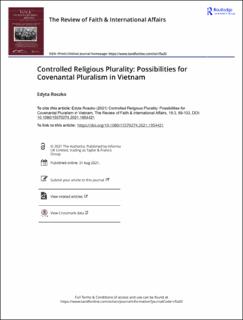Controlled Religious Plurality: Possibilities for Covenantal Pluralism in Vietnam
Journal article, Peer reviewed
Permanent lenke
https://hdl.handle.net/11250/2772336Utgivelsesdato
2021-09-01Metadata
Vis full innførselSamlinger
- Publications [1488]
Originalversjon
in The Review of Faith & International Affairs vol. 19 no. 3 pp. 90-104Sammendrag
Historically, Vietnamese approaches to religion are highly inclusive, with flexibly overlapping religious traditions and ritual practices built on a substratum of ancestor worship. As Vietnam was colonized and became independent, religion became politicized, institutionalized, and separated from the “secular” state, which sought to bring religious practices in line with new state orthodoxies. With a new understanding of “religion” predicated on the Christian model, Vietnam adopted a model of state-religion-society relations that emphasizes not only rights but also obligations, active cooperation between state and religion, and respect for all religions which are declared equal before the law, largely in response to international demands to incorporate the universal model of religious freedom. Yet, the Vietnamese state still perceives religion as a competing source of authority . Consequently, some religions are not considered for official recognition and their followers, such as highland ethnic minorities, are treated as sub-citizens by their own state. Occasionally, their conversion is misread by the rest of society as the rejection of Vietnamese culture. The failure to consider ethnic minorities as modern subjects and state citizens on a par with the Kinh (Vietnamese) majority prevents Vietnam from achieving full-fledged covenantal pluralism.
Serie
The Review of Faith & International Affairs vol. 19 no. 3The Review of Faith & International Affairs vol. 19 no. 3
